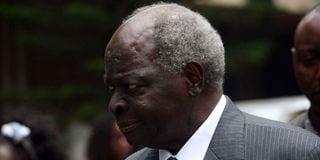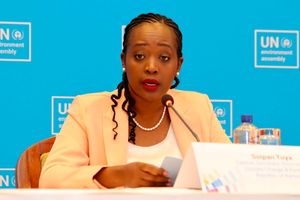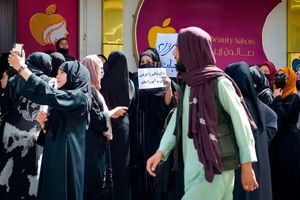
Former President Mwai Kibaki leavs Consolata Shrine in Nairobi on September 25, 2016, after attending Sunday Church Service.
President Mwai Kibaki was soft-spoken but firm.
Known for his calm and intellectual demeanor, the country’s chief executive between 2003 and 2013, also had an uncharacteristic short fuse, if you upset him.
This is a side of President Kibaki that Mr Fred Gumo, who was the then Minister for Regional Development, learnt with regret during one of the cabinet meetings.
Kisumu governor Anyang’ Nyong’o, who at the time was Medical Services minister in the grand coalition government, recalled the encounter that would expose Kibaki the “real feminist.”
The president flew into a rage during one of the cabinet meetings at State House immediately after promulgation of a new constitution in 2010.
“In line with this constitution, ministers were expected to submit Bills on the basis of which new laws would be passed by Parliament. I remember Martha Karua (then Justice and Constitutional Affairs minister) presenting a Bill which was aimed at eliminating gender-based discrimination in our statutes,” Prof Nyong’o disclosed during a recent interview with Daily Nation.
“I remember my friend (Fred) Gumo commenting that such Bills had to be carefully crafted so as not to go against the African culture where he said women do not enjoy equality with men,” narrated the former Kisumu Rural MP.
"Mr President, you know this idea that women are equal to men is very far from the truth in African culture,” Prof Nyong’o quoted Mr Gumo saying at the time.
Mr Gumo, he noted, further cautioned against Ms Karua’s Bill.

Politician Fred Gumo.
“The minister should be very careful in advocating such laws which are obviously strange to the African mind..."
President Kibaki snapped.
“Kibaki was furious,” Prof Nyong’o disclosed, recalling he snarled at Mr Gumo: “Stop that kind of nonsense, Upuzi, wacha hiyo (nonsense, stop that),” he quoted Kibaki angrily snarling at the then Westlands MP.
“You can't speak like that...you simply cannot...no! no! no! This is a cabinet of serious people..." President Kibaki reprimanded his minister.
“That is the day that I realised that Emilio Mwai Kibaki was a real feminist,” the Kisumu Governor added.
Feminism encompasses a range of ideologies and movements aimed at defining, establishing, and achieving political, economic, personal, and social equality of the sexes.
Feminists advocate for gender equality and challenge the historical, cultural and structural inequalities that women face.
Second family saga
One other time President Kibaki publicly displayed his fury was on March 3, 2009, when he denounced reports that he had a second family.
The Head of State convened a rare press conference at State House attended by the First Lady, Lucy, to state that he had only “one dear wife”, Mrs Lucy Kibaki, and four children.
“I have gotten into this foul mood after listening to some statements…I want to make it very clear that I have only one dear wife, Lucy,” the president declared.
“I do not have any other and anybody who knows me and knows my family and knows how I live knows I have one wife,” President Kibaki declared during the briefing attended by police boss Hussein Ali and Head of Civil Service Francis Muthaura.
“I have four children and you know their names. In case you don’t, you can ask me or either of them.”
He cautioned: “I want to state that anyone who is bent on that course will see me in court or wherever they will see me and I will deal with them because there is no other way.”
Prof Nyong’o, who was allied to then Prime Minister Raila Odinga’s camp in the grand coalition government that governed from 2008 to 2013, also recalled how the opposition regrouped against the repressive Moi regime after the 1997 general elections.
“Mwai Kibaki as chairman of the Democratic Party was, for all intents and purposes, the official leader of the opposition. However, he did not use this position to impose his authority on the other parties. Instead, he was always in search of consensus,” Prof Nyong’o explained.
“There is no doubt in my mind that this is the quality Raila capitalised on when he gathered the courage at that famous rally in Uhuru Park to declare "Kibaki Tosha" so as to end the apparent impasse in the Opposition finding a compromise candidate to rally around against Moi's candidate, Mr Uhuru Kenyatta,” he went on.
“Kibaki swept the polls with ease,” said Prof Nyong’o who had interacted very closely with Kibaki as the secretary to the manifesto committee of the opposition National Alliance of Kenya (NAK).
“I was passionate about two things: establishing a think tank called the National Economic and Social Council to spearhead policymaking once we were in government,” he recounted.
Prof Nyong’o explained his role in crafting a strong Economic Recovery Strategy for Wealth and Employment Creation after Narc came to power in 2002.
This, he said, was meant to “pull us off the abyss of economic stagnation that Moi had pushed the nation into after decades of corruption and misrule.”
President Kibaki and his then State House comptroller Matere Kereri, Prof Nyong’o revealed, gave strong support for these policies.

Former President Mwai Kibaki.
“Well, before the Cabinet was announced, Matere confided in me that Kibaki had decided to give me the portfolio of National Planning and Economic Development, with the concurrence of Raila, in the new Cabinet,” he revealed.
“Once in government, the Head of Public Service, my friend Francis Muthaura, and I used to meet the President almost every Wednesday morning for no more than 40 minutes to consult and brief him about the economy.”
He disclosed he had been instructed to prepare a few paragraphs which “we would clinically go through for the President to get a good grasp of the state of affairs in the economy and what needed to be paid attention to.”
President Kibaki, an economist with a long career in public service, is credited with steering economic revival and infrastructure expansion during his tenure.
Other achievements include the introduction of free primary education, constitutional reforms, healthcare improvement, strides in telecommunication and crafting Vision 2030.
The economy surged largely attributed to his policies on economic liberalisation, improving public sector management, and investment in infrastructure.
FPE significantly increased enrollment rates across the country with millions of children accessing education.
He also played a crucial role in the promulgation of a new Kenyan constitution in 2010, which was a significant step towards political stability and governance reform.
The new constitution enhanced civil liberties, decentralised government through the establishment of counties, and reformed land ownership laws.
The Kibaki administration focused heavily on improving Kenya’s infrastructure and this included the expansion of the road network, renovation of airports, and modernisation of ports, which facilitated trade and opened up remote areas of the country.
The administration also presided over the expansion of healthcare facilities and the enhancement of service delivery in existing facilities.
President Kibaki launched Kenya Vision 2030 in 2008, a long-term development program aimed at transforming Kenya into a newly industrialising, middle-income country by 2030.
The program focuses on three key pillars: economic, social, and political governance.
On telecommunication expansion, his government oversaw a boom in the sector, particularly with the expansion of mobile phone usage and internet access, which has been pivotal in driving Kenya’s information and communication technology sector forward.








